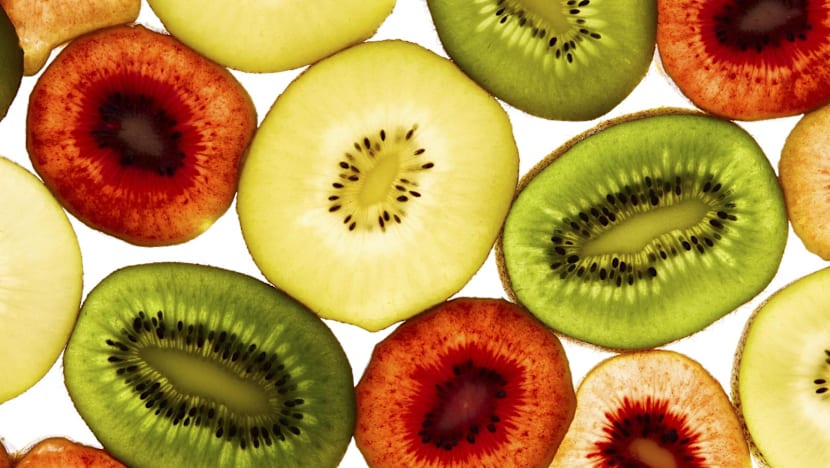Health
Discover Why Kiwis Are the Ultimate Healthy Snack Choice

Nutritionists are increasingly advocating for the inclusion of kiwis in daily diets, highlighting their impressive health benefits. These small, brown fruits, often overlooked in favor of staples like apples and bananas, are rich in essential nutrients and can positively impact overall health.
Rich Nutritional Profile
Kiwis are packed with nutrients, making them a valuable addition to any diet. A medium-sized kiwi contains just over two grams of fibre and only 48 calories. The skin is especially high in fibre, which aids digestion and helps regulate blood sugar levels. According to Judy Simon, a clinical dietitian at the University of Washington Medical Center, fibre plays a crucial role in preventing spikes in blood sugar that can lead to Type 2 diabetes.
Kiwis also stand out for their Vitamin C content. One kiwi provides approximately 56 mg of this essential nutrient, exceeding the amount found in a clementine or half a grapefruit. This amount equates to about 62 percent of the recommended daily intake for men and 75 percent for women. Dietitian Danielle Davis from NYC Health + Hospitals/Bellevue emphasizes that Vitamin C supports the immune system and is vital for wound healing. Furthermore, kiwis contain around 150 mg of potassium, contributing to blood pressure regulation by counteracting excess sodium.
Digestive Benefits and Sleep Quality
Kiwi fruit’s benefits extend to digestive health as well. Dr. Shanti Eswaran, a gastroenterologist at Michigan Medicine, often recommends kiwis to her patients seeking natural relief from constipation. Research suggests that kiwis are more enjoyable to eat compared to other high-fibre fruits, such as prunes. A 2023 study involving approximately 200 participants found that consuming two green kiwis daily led to an increase in bowel movements.
Kiwis contain both soluble and insoluble fibre, which work together to alleviate constipation. Soluble fibre forms a gel-like substance in the intestines, softening stool, while insoluble fibre adds bulk and promotes regular movement. Additionally, kiwis are one of the few fruits that contain the enzyme actinidin, which may help in protein digestion, although further research is needed to confirm this effect in humans.
Some social media users claim that eating kiwis can enhance sleep quality. A small study conducted in 2023 indicated that elite athletes who consumed two kiwis one hour before bedtime reported improved sleep. While kiwis contain trace amounts of melatonin and serotonin, a connection to sleep improvements is not yet strongly supported by research. Simon notes that those who experience better sleep may simply be benefiting from healthier dietary choices rather than the kiwis themselves.
Easy Ways to Incorporate Kiwis Into Your Diet
There are numerous ways to enjoy kiwis, making them a versatile snack. Simon suggests blending them into smoothies or adding them to fruit salads and Greek yogurt. For those willing to try the skin, Davis recommends starting with yellow kiwis, which have a smoother texture.
With their nutrient density and delicious taste, kiwis are not just a trend; they are a beneficial addition to a healthy diet. As nutritionists continue to highlight their advantages, it’s clear that these small fruits can make a significant impact on health and wellness.
-

 World5 months ago
World5 months agoSouth Korea’s Foreign Minister Cho Hyun to Visit China This Week
-

 Business5 months ago
Business5 months agoStarling Bank Plans Secondary Share Sale, Targeting $5.4 Billion Valuation
-

 Top Stories5 months ago
Top Stories5 months agoMunsang College Celebrates 100 Years with Grand Ceremony
-

 World5 months ago
World5 months agoPAS Aims to Expand Parliamentary Influence in Upcoming Election
-

 Business7 months ago
Business7 months agoKenvue Dismisses CEO Thibaut Mongon as Strategic Review Advances
-

 Lifestyle6 months ago
Lifestyle6 months agoHumanism Camp Engages 250 Youths in Summer Fest 2025
-

 Sports6 months ago
Sports6 months agoDe Minaur Triumphs at Washington Open After Thrilling Comeback
-

 Sports7 months ago
Sports7 months agoTupou and Daugunu Join First Nations Squad for Lions Clash
-

 Top Stories7 months ago
Top Stories7 months agoColombian Senator Miguel Uribe Shows Signs of Recovery After Attack
-

 World7 months ago
World7 months agoASEAN Gears Up for Historic Joint Meeting of Foreign and Economic Ministers
-

 Health6 months ago
Health6 months agoNew Study Challenges Assumptions About Aging and Inflammation
-

 Business7 months ago
Business7 months agoOil Prices Surge Following New EU Sanctions on Russia









